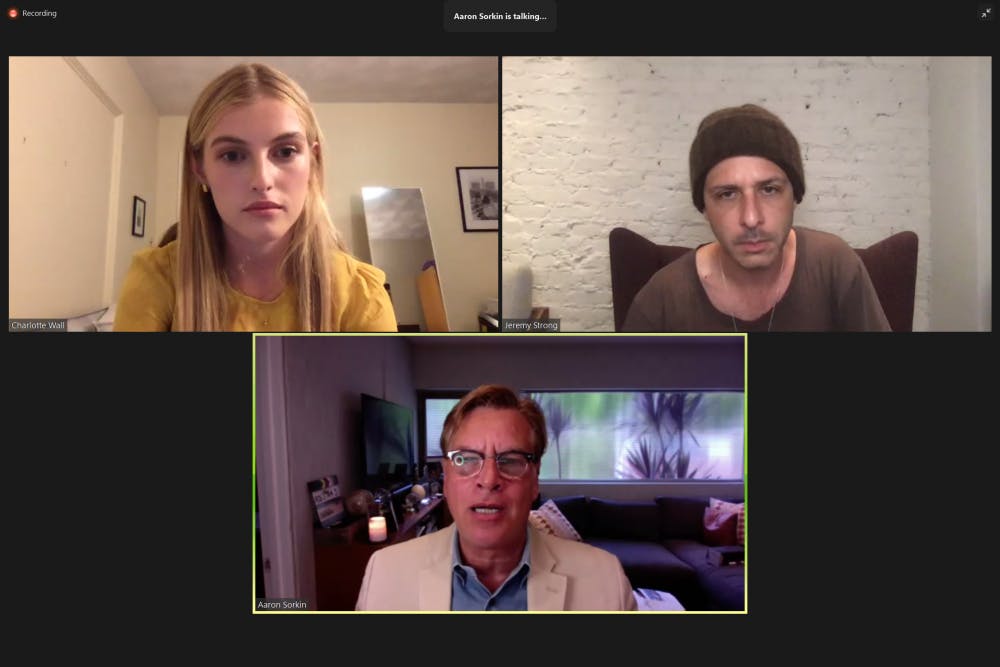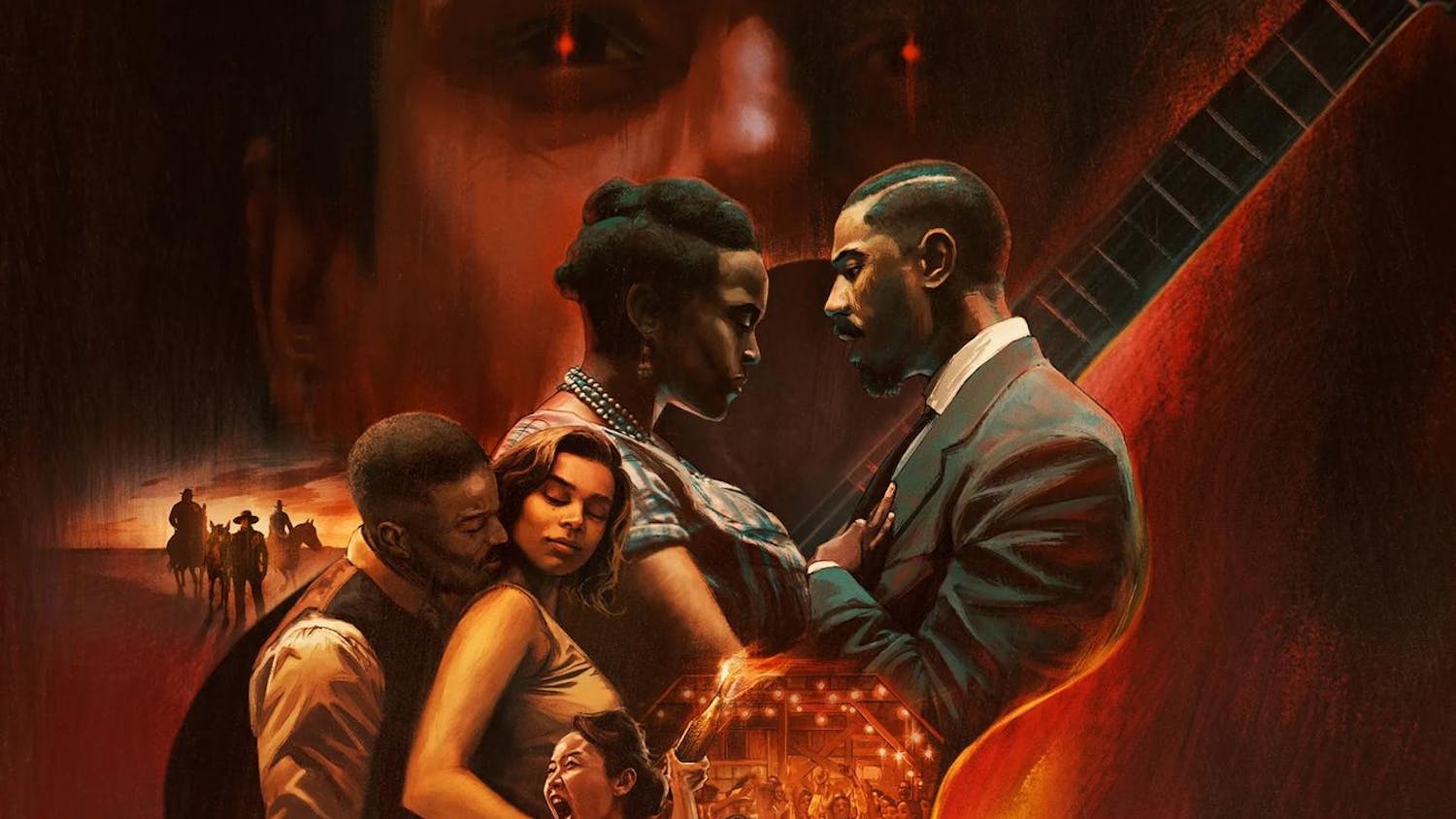The Ivy Film Festival welcomed renowned writer and director Aaron Sorkin and acclaimed actor Jeremy Strong for a conversation on their latest film “The Trial of the Chicago 7” on the evening of Oct. 21.
The historical courtroom drama is based on the infamous 1969 trial. Abbie Hoffman, Jerry Rubin, David Dellinger, Tom Hayden, Rennie Davis, John Froines and Lee Weiner were all charged with inciting riots and conspiring in countercultural and anti-Vietnam War protests at the 1968 Democratic National Convention in Chicago. The film focuses on the proceedings during the district court trial phase where the seven defendants were faced with the antagonization of Judge Julius Hoffman. While all defendants were ultimately acquitted of conspiracy charges, five were convicted for inciting riots and contempt of court. These convictions were later reversed on appeal.
“It all started when Steven Spielberg invited me to his house,” said Sorkin, who was approached by Spielberg with the idea for the film almost two decades ago. “I thought it was possible that I was going to be killed — but instead he said he wanted to make a movie about the Chicago 7,” Sorkin joked. “I left his house, called my father and asked who the Chicago 7 were. So at the beginning, I was just excited to work with Steven Spielberg.”
Because of his lack of prior knowledge about the case, Sorkin had to do a great deal of research, referencing books, “a 200-page trial transcript” and several conversations with Hayden. Hayden passed away in 2016, but the film’s portrayal of his character, played by Eddie Redmayne, pays tribute to his life as an anti-war and civil rights activist.
Sorkin wrote the screenplay 14 years ago, but “the project kept getting kicked down the road for a lot of reasons, one of them being the riots (in the film),” Sorkin said. “We didn’t have the budget for those scenes.” Finally, the production came together for “a confluence of reasons.”
One of these reasons was the 2016 election. Trump “would look at rioters and say stuff like, ‘In the old days we would have carried that guy out on a stretcher,’” Sorkin explained. “He was talking about 1968. Those were the old days.”
Sorkin also attributed his ability to finally create the film to the experience he gained from making “Molly’s Game,” his directorial debut in which Strong also acted. “I remember asking you that last day on set what was happening with the (Chicago 7) script because it really was the greatest script I had ever read,” Strong said. “I like to think I had a hand in finally getting (the movie) made,” he added, laughing.
“I think it’s an important film for people to watch right now and see the historical connection to what is happening right now in the United States,” said Charlotte Wall ’22, a member of IFF and moderator of the event.
“Between the demonization of protests, … police brutality … we didn’t need it to get more relevant but then it did suddenly,” Sorkin agreed, in reference to the resurgence of protests relating to the Black Lives Matter movement after the murder of George Floyd.
“It’s all a bit surreal,” Strong said. While filming, “we were in Chicago … marching down Michigan Avenue and chanting ‘no justice no peace,’ and ‘the people united’ — the same chants they were yelling at the police riots,” he added. “It’s troubling because it speaks to how far we haven’t come in this country. The people we portrayed in this film? They’d be on the front lines right now.”
Strong paused and gestured to his virtual audience. “They’d be you guys,” he said.
“You know what else they’d be?” Sorkin asked. “They’d be women. That’s what we’ve seen more and more, especially these last few years all starting with the Women’s March immediately after (Trump’s) inauguration.”
Conversation arose around Trump’s presidency and the portrayal of Judge Hoffman in the film. “I really saw the judge as a figure of male, white supremacy,” Wall said, prompting Strong to ask Sorkin: “Do you think the judge is a simulacre for Trump?”
“Yes. He is the authoritarian … trying to preserve with (his) last breath that quieter, whiter, 1950s America.” He is “the guard of white America,” Sorkin responded.
“It was interesting to see how (Sorkin) has adapted with the times,” said Isabella Yepes ’23, a member of IFF who watched the film and attended the livestream. “‘The West Wing,’ for example, was very idealistic, while I think this film shows the justice system at its worst,” she said.
“Sorkin’s body of work has always been relevant but ‘The Trial of the Chicago 7’ is especially stunning in its eerie echo of our polarized country in violent conflict today,” Sasha Pinto ’21, a director of IFF, wrote in an email to The Herald. For example, “film scenes showing the demonization of peaceful protests and police brutality in 1968 looked disturbingly similar to what we saw last summer in places like Minneapolis, Seattle, Kenosha, Lexington and Lafayette Park,” she added.
Sorkin stated that he maintains faith in the institutions of democracy, “but it really matters who is in there. … (The film) is a call to action to vote, please. And if you are young and healthy as I assume many of you are, go volunteer as a poll worker for just a few hours.” He and Strong mentioned that students could find polling places and volunteer opportunities at vote.org and protectthevote.net.
This call to action was an “extremely special” way to end the talk, Claire Zhang ’22, a director of IFF, wrote in an email to The Herald. It “truly highlighted the relevancy of our conversation … and how, in many ways, the film characters and plot mirror today’s political and social climate.”

ADVERTISEMENT




